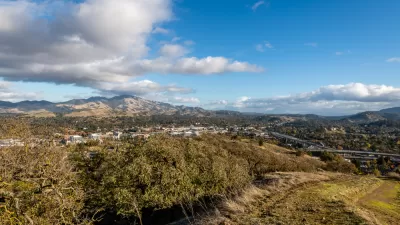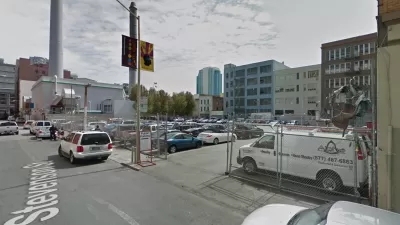The future of planning in California depends on how lawyers reconcile the Housing Accountability Act with the California Environmental Quality Act.

Christopher S. Elmendorf and Tim Duncheon write the first in a series of blog posts to examine the merging conflict between the state of California's Housing Accountability Act (HAA) and the California Environmental Quality Act (CEQA).
According to Elmendorf and Duncheon, the emerging conflict was made obvious when the San Francisco Board of Supervisors rejected a proposal for 495 apartments on a downtown parking lot. "Oakland and Sonoma have also used the same maneuver, albeit to much less fanfare."
According to the article, these examples are early indications of an "epic clash" between two examples of legal scholars Bill Eskridge and John Ferejohn have termed "super-statutes," and defined as followed:
(1) seeks to establish a new normative or institutional framework for state policy and (2) over time does “stick” in the public culture such that (3) the super-statute and its institutional or normative principles have a broad effect on the law—including an effect beyond the four corners of the statute.
The fact that both laws could be fairly classified as super-statutes creates a massive problem, which is likely to be litigated again and again for the foreseeable future: both the laws "could not be more different in their basic institutional and normative principles," according to Elmendorf and Duncheon.
In the second post in the series, which has also been published as of this writing, the authors show that CEQA and the HAA further elaborate on the idea that both CEQA and the HAA have plausible claims to being super-statutes.
FULL STORY: A Seismic Shift in Land Use Law?

Study: Maui’s Plan to Convert Vacation Rentals to Long-Term Housing Could Cause Nearly $1 Billion Economic Loss
The plan would reduce visitor accommodation by 25,% resulting in 1,900 jobs lost.

North Texas Transit Leaders Tout Benefits of TOD for Growing Region
At a summit focused on transit-oriented development, policymakers discussed how North Texas’ expanded light rail system can serve as a tool for economic growth.

Alabama: Trump Terminates Settlements for Black Communities Harmed By Raw Sewage
Trump deemed the landmark civil rights agreement “illegal DEI and environmental justice policy.”

How Community Science Connects People, Parks, and Biodiversity
Community science engages people of all backgrounds in documenting local biodiversity, strengthening connections to nature, and contributing to global efforts like the City Nature Challenge to build a more inclusive and resilient future.

Alabama: Trump Terminates Settlements for Black Communities Harmed By Raw Sewage
Trump deemed the landmark civil rights agreement “illegal DEI and environmental justice policy.”

Dear Tesla Driver: “It’s not You, It’s Him.”
Amidst a booming bumper sticker industry, one writer offers solace to those asking, “Does this car make me look fascist?”
Urban Design for Planners 1: Software Tools
This six-course series explores essential urban design concepts using open source software and equips planners with the tools they need to participate fully in the urban design process.
Planning for Universal Design
Learn the tools for implementing Universal Design in planning regulations.
City of Santa Clarita
Ascent Environmental
Institute for Housing and Urban Development Studies (IHS)
City of Grandview
Harvard GSD Executive Education
Toledo-Lucas County Plan Commissions
Salt Lake City
NYU Wagner Graduate School of Public Service





























